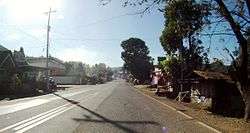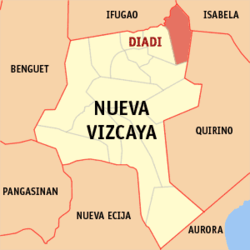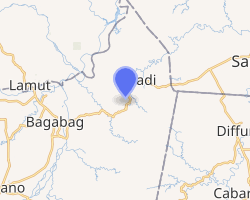Diadi
Diadi, officially the Municipality of Diadi (Gaddang: Ili na Diadi; Ilocano: Ili ti Diadi; Tagalog: Bayan ng Diadi), is a 4th class municipality in the province of Nueva Vizcaya, Philippines. According to the 2015 census, it has a population of 18,122 people.[3]
Diadi | |
|---|---|
| Municipality of Diadi | |
 Maharlika Highway | |
 Seal | |
 Map of Nueva Vizcaya with Diadi highlighted | |
OpenStreetMap 
| |
.svg.png) Diadi Location within the Philippines | |
| Coordinates: 16°38′N 121°21′E | |
| Country | |
| Region | Cagayan Valley (Region II) |
| Province | Nueva Vizcaya |
| District | Lone district |
| Barangays | 19 (see Barangays) |
| Government | |
| • Type | Sangguniang Bayan |
| • Mayor | Sandy M. Gayaton |
| • Vice Mayor | Norma U. Miguel |
| • Congressman | Luisa L. Cuaresma |
| • Electorate | 11,149 voters (2019) |
| Area | |
| • Total | 181.20 km2 (69.96 sq mi) |
| Population (2015 census)[3] | |
| • Total | 18,122 |
| • Density | 100/km2 (260/sq mi) |
| • Households | 4,403 |
| Economy | |
| • Income class | 4th municipal income class |
| • Poverty incidence | 15.00% (2015)[4] |
| • Revenue (₱) | 73,269,835.66 (2016) |
| Time zone | UTC+8 (PST) |
| ZIP code | 3712 |
| PSGC | |
| IDD : area code | +63 (0)78 |
| Climate type | tropical rainforest climate |
| Native languages | Gaddang Ilocano Ilongot Tagalog |
| Website | www |
Barangays
Diadi is politically subdivided into 19 barangays.
- Ampakleng
- Arwas
- Balete
- Bugnay
- Butao
- Decabacan
- Duruarog
- Escoting
- Langka
- Lurad
- Nagsabaran
- Namamparan
- Pinya
- Poblacion
- Rosario
- San Luis (boundary of Cordon, Isabela)
- San Pablo
- Villa Aurora
- Villa Florentino
Demographics
| Year | Pop. | ±% p.a. |
|---|---|---|
| 1970 | 4,407 | — |
| 1975 | 6,649 | +8.60% |
| 1980 | 8,605 | +5.29% |
| 1990 | 11,351 | +2.81% |
| 1995 | 12,469 | +1.78% |
| 2000 | 14,374 | +3.09% |
| 2007 | 15,567 | +1.11% |
| 2010 | 16,484 | +2.10% |
| 2015 | 18,122 | +1.82% |
| Source: Philippine Statistics Authority[3][5][6][7] | ||
Tilapia industry
On January 11, 2008, the Cagayan Bureau of Fisheries and Aquatic Resources (BFAR) stated that tilapia production grew and Cagayan Valley is now the Philippines’ tilapia capital. Production supply grew 37.25% since 2003, with 14,000 metric tons (MT) in 2007. The recent aquaculture congress found that the growth of tilapia production was due to government interventions: provision of fast-growing species, accreditation of private hatcheries to ensure supply of quality fingerlings, establishment of demonstration farms, providing free fingerlings to newly constructed fishponds, and the dissemination of tilapia to Nueva Vizcaya (in Diadi town). Former cycling champion Lupo Alava is a multi-awarded tilapia raiser in Bagabag, Nueva Vizcaya. Chairman Thompson Lantion of the Land Transportation Franchising and Regulatory Board, a retired two-star police general, has fishponds in La Torre, Bayombong, Nueva Vizcaya. Also, Nueva Vizcaya Gov. Luisa Lloren Cuaresma also entered into similar aquaculture endeavors in addition to tilapia production.[8]
References
- "Municipality". Quezon City, Philippines: Department of the Interior and Local Government. Retrieved 31 May 2013.
- "Province: Nueva Vizcaya". PSGC Interactive. Quezon City, Philippines: Philippine Statistics Authority. Retrieved 12 November 2016.
- Census of Population (2015). "Region II (Cagayan Valley)". Total Population by Province, City, Municipality and Barangay. PSA. Retrieved 20 June 2016.
- "PSA releases the 2015 Municipal and City Level Poverty Estimates". Quezon City, Philippines. Retrieved 1 January 2020.
- Census of Population and Housing (2010). "Region II (Cagayan Valley)". Total Population by Province, City, Municipality and Barangay. NSO. Retrieved 29 June 2016.
- Censuses of Population (1903–2007). "Region II (Cagayan Valley)". Table 1. Population Enumerated in Various Censuses by Province/Highly Urbanized City: 1903 to 2007. NSO.
- "Province of Nueva Vizcaya". Municipality Population Data. Local Water Utilities Administration Research Division. Retrieved 17 December 2016.
- Abs-Cbn Interactive, Cagayan Valley country’s tilapia capital
External links
![]()